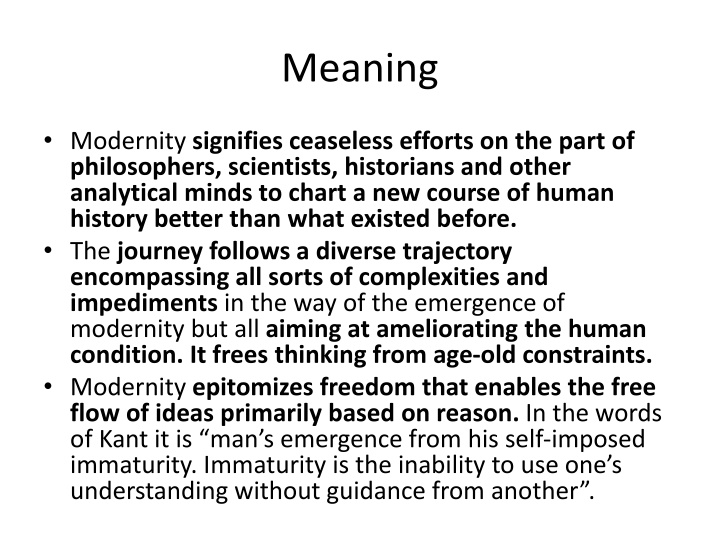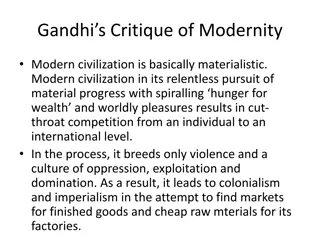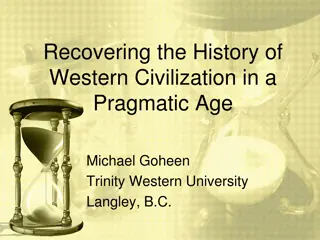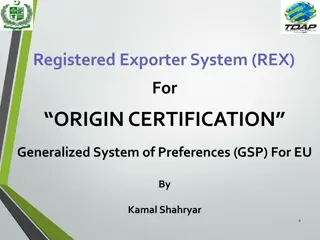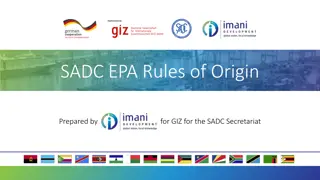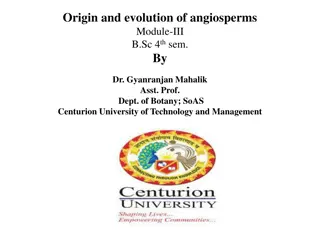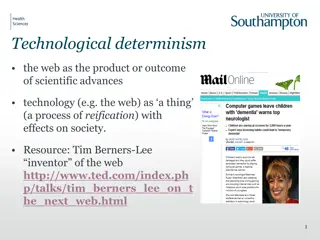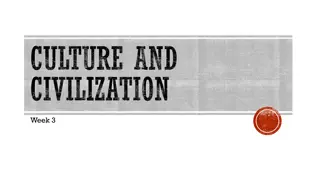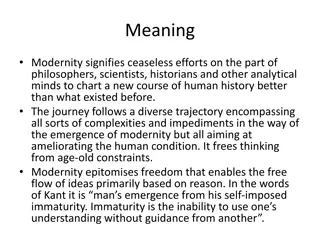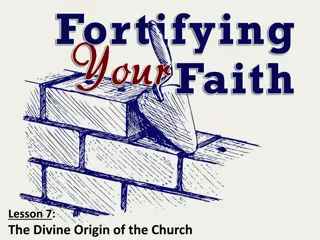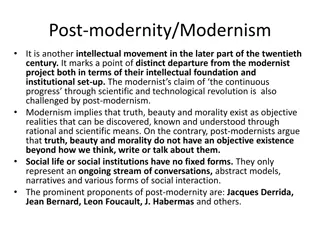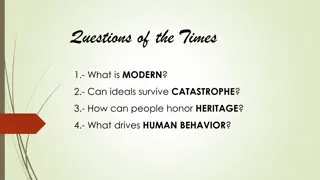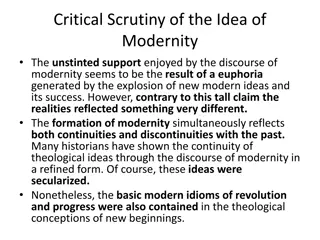Exploring the Significance and Origin of Modernity
Modernity embodies the relentless pursuit of progress in human history, driven by freedom, reason, and the desire to improve the human condition. It traces back to the European enlightenment of the 18th century and is associated with philosophical, scientific, and social revolutions. The concept of modernity has evolved through various historical events, shaping societal, political, and economic structures while emphasizing the importance of rational thinking and societal change.
Download Presentation

Please find below an Image/Link to download the presentation.
The content on the website is provided AS IS for your information and personal use only. It may not be sold, licensed, or shared on other websites without obtaining consent from the author.If you encounter any issues during the download, it is possible that the publisher has removed the file from their server.
You are allowed to download the files provided on this website for personal or commercial use, subject to the condition that they are used lawfully. All files are the property of their respective owners.
The content on the website is provided AS IS for your information and personal use only. It may not be sold, licensed, or shared on other websites without obtaining consent from the author.
E N D
Presentation Transcript
Meaning Modernity signifies ceaseless efforts on the part of philosophers, scientists, historians and other analytical minds to chart a new course of human history better than what existed before. The journey follows a diverse trajectory encompassing all sorts of complexities and impediments in the way of the emergence of modernity but all aiming at ameliorating the human condition. It frees thinking from age-old constraints. Modernity epitomizes freedom that enables the free flow of ideas primarily based on reason. In the words of Kant it is man s emergence from his self-imposed immaturity. Immaturity is the inability to use one s understanding without guidance from another .
Nature and Origin Modernity is considered to be an offshoot of European enlightenment of the 18thcentury. Kant defines it as the freedom to make public use of one s reason with the goal of liberating mankind from its self-imposed immaturity. It simply implies that both physical and moral worlds can be comprehended with the application of reason which is what he meant by public use of one s reason. Modernity driven in the spirit of enlightenment gave rise to a new philosophy centering around self and society-creation of a new mentality.
Nature and Origin (Contd.) Some have traced it back to the age of exploration and the discovery of the new world, beginning in the 15th century, others to the scientific revolution of Harvey, Galileo, and Newton, and still others to the philosophical innovations of Descartes, Hobbes, and Spinoza with their quest for new rational foundations for knowledge. Modernity has also been associated with the devastating wars of religion that wrecked Europe through out the 16th century and brought about the beginnings of our modern theories of secularism and toleration. Modernity has been identified with the social and political revolutions of 1688, 1776 and 1789 that for the first time introduced the language of equality and the rights of man.
The Discursive Quest of the Concept It underlines a long and sustained process of the formation of modernity. It would indeed be na ve to privilege one singular factor for its formation from among many criss-crossing and overlapping factors. Hence, it is important to consider all these factors together in order to weave a coherent and comprehensive meaning of modernity. It is normal that paradigmatic change invariably impacts upon different aspects of social, political, economic and cultural life of a society passing through such far-reaching changes. Capturing these changes in a systematic manner, Stuart Hall has identified the nature, range and scope of the change in the following ways:
Nature, Range and Scope of the Change A) The Dominance of secular forms of political power and authority and conceptions of sovereignty and legitimacy, operating within defined territorial boundaries, which are characteristics of the large, complex structures of the modern nation-state. B) A monetarised exchange economy, based on the large-scale production and consumption of commodities for the market, extensive ownership of private property and the accumulation of capital on a systematic and long- term basis.
Nature, Range and Scope (Contd.) C) The decline of the traditional social order with its fixed social hierarchies and overlapping allegiances and the appearance of a dynamic social and sexual division of labour. In modern capitalist societies this was characterized by new class formations and distinctive patriarchal relations between men and women. D) The decline of the religious world view typical of traditional societies and the rise of a secular and materialist culture, exhibiting those individualistic, rationalist and instrumental impulses now so familiar to us. In addition to these four two additional cultural factors also accounted for the formation of modern European societies:
Nature, Range and Scope (Contd.) i. First, the emergence of modern knowledge through the processes set in motion from the Renaissance, the scientific revolution of the 17thcentury to the enlightenment of the 18thcentury that gave birth to a new intellectual and cognitive world in Europe. The impact of this was evident in the emergence of early capitalism and nation-state. Secondly, the religious social marker of traditional society-Christian and Catholic-was gradually replaced by a strong sense of community built around the construction of the European community. ii.
Teleological Conception of Modernity The interplay of the factors mentioned above and the changes introduced by them in the form of modernity did not follow a unilinear historical path. It defies the pattern of homogeneous historical time of its development. In contrast, a unified notion of modernity based on a single historical time scale is being presented by those who believe in the inevitability of the European kind of modernity.
Teleological Conception of Modernity Rejected According to them history follows a set pattern to achieve a preordained goal of emergence of a particular modern society. But now this teleological view of history is rejected as it fails to capture the complexities of the formation of modern societies. Such a kind of fallacious argument was promoted in the 1950s in the form of the modernization theory- e.g. Rostow model (Walter Rostow).
Eurocentric Narrative of Modernity Under the modernization theory the basic assumptions that were suggested for the development of newly independent countries of the third world, were to emulate the path of western industrialization and its concomitant social values. Later this hegemonic notion of modernity was utterly disowned and rejected by the developing countries as a Eurocentric narrative of modernity. Even a cursory glance at the diverse processes of industrialization in Europe would explain the inadequacy of the mono-causal explanation of the formation of modern societies. It is not difficult to discern the different patterns of industrialization in England, France, Russia and Germany.
Patterns of Industrialization and Political Systems While in the case of England and France consumer industries inaugurated the gradual process of industrialization, in case of Russia and Germany heavy industries occupied faster investment, urgency and pace. The different trajectories of industrialization could be related to the emergence of democratic political regimes in England and France and non- democratic ones in Russia and Germany. A long, sustained and gradual process of development laid the foundation of a democratic political system, while the hurried processes in Germany and Russia did not augur well for democratic development.
Development of Democracy in the Western and Indian Societies According to Prof Sudipto Kaviraj, in the West three major historical processes were substantially complete before transformation towards modern democracy began. The capitalist disciplining of workforce through brutal production regimes, the establishment of a secular state to avoid endless civil wars between religious groups vying for political control of the state and the birth of a modern civil society of individuation- all preceded the start of the democratic process.
Development of Democracy(Contd.) But the advent of democracy in India largely preceded the plank of development as well as the advent of modern civil society and a distinct sense of individuality. Such contextual differences explain the varied nature of democratic politics in India and the West and also the endurance of democracy in India despite apparent challenges and unsuitable conditions.
A Brief Philosophical Background of Modernity The multiple conceptions constituting the discourse of modernity reflect themselves in the innovative articulations of philosophers who dared to challenge the theological world view that restrained practical human imagination and snapped her/his ties with the real world of existence. First, it was Machiavelli who came to the forefront in the 15thcentury to conceive the new ideas of the real/empirical world fighting the world of speculation and inertia.
A Brief Philosophical Background (Contd.) He is known as the founder of a new science of politics which is based on the causal analysis of facts and their correlation. It would be based on a new appreciation for empiricism, an inductive spirit that limits itself to what can be seen, observed, measured and quantified. The new Machiavellian political science would be a science of power. The limitless possibility of the enhancement of knowledge by science was recognized. It was believed that the standard of science could be applied to every human endeavour.
The Scientific Revolution (16thand 17th Century) The society was entering a new age of Enlightenment that promised to submit not only nature but all social, political, and religious authorities to the sovereign control of reason and experience. The development of the modern nation-state as a sovereign, autonomous political form was coming to the fore. Therefore, it was important for philosophers like Hobbes, Bodin, Spinoza and Locke that a whole new politics was necessary to make a comeback of theological politics impossible. So they were for a form of secular politics which would submit theology to political control.
Emergence of the Sovereign Individual Even in the famous phrase of the Treaty of Westphalia it was said that henceforth the head of each state would have the right to determine the religion of the state. Corresponding to the idea of the emergence of the sovereign state was the emergence of the sovereign individual freeing him/her from the centuries-old bondage to the clutches of primordial loyalties. The emerging idea of the modern self was further reinforced by Descartes, the founder of modern philosophy who displayed an extraordinary faith in the power of human thinking. I think therefore I am (cogito ergo sum).
Emergence of the(Contd.) This resulted in the philosophical claim of new individualism. Descartes notion of individuals was also supplemented by the primacy he accorded to doubt and the rules of method that became potent means of self-education.
Transition from Natural Society to Civil Society The founders of modern philosophy explained modern politics in terms of a long struggle of ascent from the state of nature to civil society. By civil society was meant a civilization whose pillars were property, science and commerce. It was the transition from natural society to civil society that formed the basis for the great enlightenment theories of history given expression by Locke, Kant and Condorcet.
